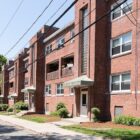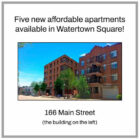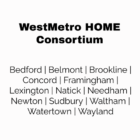Around Town
Watertown Housing Authority Teams with Non-Profit to Revitalize the Willow Park Property
|
The Watertown Housing Authority will team with Preservation of Affordable Housing to renovate the Willow Park property. (Courtesy of the WHA)
The following announcement was provided by the Watertown. Housing Authority:
The Watertown Housing Authority (WHA) announced that it will be partnering with the Preservation of Affordable Housing (POAH) to redevelop the Willow Park State Public Housing property located in East Watertown. The POAH team was selected earlier this month by the WHA’s Board of Commissioners and Selection Committee after reviewing the proposals. “I want to thank everyone on the pre-development team for their hard work.



